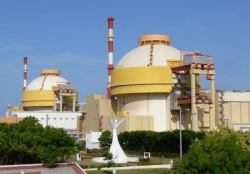Singh: Foreign groups behind anti-nuclear protest
24 February 2012
Indian prime minister Manmohan Singh has said that groups protesting the start-up of two new reactors at Kudankulam don't understand the energy situation in India and are based in foreign countries.
His words came during an interview with Science magazine in which he emphasised the fundamental role that science can play in supporting Indian development.
Singh criticised some sources of opposition to biotechnology: "There are NGO's, often funded from the United States, and the Scandinavian countries, which are not fully appreciative of the development challenges that our country faces..."
He continued: "You know, for example, what's happening in Kudankulam. The atomic energy program had got into difficulties because these NGOs, mostly I think based in the United States, don't appreciate the need for our country to increase the energy supply."
 |
Ready to go: Kudankulam's 950 MWe units would
provide enough electricity for nearly 20 million people
at the current national average consumption rate of
just 750 kWh per year |
Indian leaders are involved in a unique controversy at Kudankulam, a nuclear power project begun in 1988 by then prime minister Rajiv Gandhi and Soviet President Mikhail Gorbachev. The two VVER pressurized water reactors were completed shortly before the Fukushima accident of March 2011. Several months later, during the commissioning phase of the plant, a powerful local protest movement suddenly grew up around S P Udayakumar and his People's Movement Against Nuclear Energy.
The government began a probe into the funding of the group in November, with its result apparently being revealed today by Singh in the Science interview. Foreign anti-nuclear groups had previously been accused of stirring up unrest at the proposed site of a new nuclear power plant at Jaitapur, with this even resulting in the death of a protester in clashes with police.
Regional and national figures have been increasingly drawn into the Kudankulam controversy - including former president and professor of aerospace engineering APJ Abdul Kalam, who said there was no need even for 'nano-sized' doubts about safety. Local government ordered a halt to commissioning until fears were satisfactorily allayed while the central government launched numerous panels and reports intended to explain the safety features of the plant.
Russia has grown frustrated with the delays. An embassy official told reporters: "We are not setting any deadline. But our scientists are sitting idle since October 2011. They are scientists of highest calibre and their services are very much needed in countries, including Slovakia and Russia."
Public information push
One result of the problem has been a major effort from Indian nuclear leaders to actively engage the public in discussion of nuclear energy - something that had not happened before. Reliable polls have never been taken to guage public opinion on nuclear. The scope of the work is daunting due to India's vast population and diverse makeup in terms of religion and language as well as levels of literacy and education.
Operators of nuclear facilities have begun to engage more actively with local communities, and to support local infrastructure projects such as the construction of footbridges, bus stops and school buildings or the installation of lighting in public places. In line with the scientific management of India's nuclear program, the messages for the public have emphasised the advantages of nuclear power in terms of economic benefits, carbon dioxide, reliability, statistical safety as well as simply the provision of power on a large scale. It's not clear if the strategy has been effective in penetrating some of the basic fears which officials accuse anti-nuclear groups of stirring up: that rural livelihoods will be damaged or children's health harmed.
Singh was asked if he thought nuclear energy still had a role in India post-Fukushima. His reply: "Yes, where India is concerned, yes. The thinking segment of our population certainly is supportive of nuclear energy."
Researched and written
by World Nuclear News